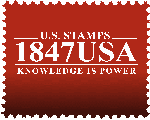How To Buy Online
Tips - What To Watch For
This is a list of various thing to watch out for in online listings. It represents the most common things we see in listings that can mislead or deceive buyers of stamps. Some of these practices are not ‘illegal’, some may not even be intentional, but all end up causing misunderstandings and/or costly returns. Many of these may look familiar to the experienced online buyers and they have learned to avoid these kinds of listings.

Catalog Pricing
A very common practice is to use an incorrect catalog value in a listing to attract higher bids. Sometimes sellers will use an out-of date catalog, other times they will use an incorrect catalog value for the grade or condition of a stamp. For example, using a ‘Never Hinged’ catalog value for a regummed stamp can commonly be found in many listings.
The solution for this practice is to always look up the catalog value yourself, never rely upon the stated catalog value in a listing. Sellers who consistently misstate the catalog values should cause you to seriously consider their business ethics. If you want to include a catalog value in your listings, you should always note the catalog name and version that it came from.
Grading
Grading is often misunderstood or misused. A stamp grade can be any one of several standards, including the sellers own opinion. Always be cautious when purchasing a stamp based upon grading; verify that the stamp is indeed what you believe the title or description states the grade is. Contact the seller and ask questions if there is any doubt, ask for additional images. Always insist on a third-party expert-service certificate that agrees with the grade claimed by the seller.
Certifications
Certifications are often mentioned or included in a listing. First thing to do is verify that the certification comes from a reputable, recognized service. ‘Self certs’ should be avoided or ignored, anyone can print up a certification for their own material but this is an obvious conflict of interest and a sign of potential deception. Fake or forged certs can sometimes be used, if you have any question take the time to look up the certification with the original service to check its legitimacy. Examine the cert and the stamp closely, make sure the stamp is the same described in the cert.
Always find out from the seller BEFORE you bid exactly what his policy is for allowing certification by third party expert services? Sometimes sellers won't allow it at all (you might strongly consider avoiding this type of seller), some WILL allow it but with certain restrictions, such as "only items that sell for over $100." or "Only with a 10-day return privilege" (which is highly unfair and those sellers might be avoided). Ask if the seller will reimburse you for the cost of third party expertizing if the item is found to be different than described? If no, ask if they might be willing to split the costs? Understanding the seller's policy on expertizing is very important so clear it up before you bid.
Lies of Omission
This is a very common practice by some sellers. They simply provide a single image of the stamp and fail to mention any one of many faults or flaws. As a buyer you should be very cautious when a listing contains only a single image and little or no description. Contact the seller and ask for additional images; including the back of the stamp. You would not buy a car without a test drive or book only by its cover. Learn to recognized filled, thins, and repaired stamps, if the back of the stamp looks suspicious then it probably will have hidden faults once you get it in your hands. This is especially true once you put the stamp in fluid; checking your purchases in fluid will often reveal that you have just purchased a stamp with undisclosed faults. Note that you can always ask the seller if they have check the stamp in fluid before buying. If they have not, ask if you can return for full refund if you find faults after purchase.
Location Spoofing
Some sellers state the location of the stamps you purchase in one location but they are actually based in another country. Note that this in and of itself is may not be a sign of wrong doing, but it is enough to ask more questions. First, be aware that any legal recourse will be much harder if it involves crossing international borders. Second, note that some dicey sellers may require you to return a stamp to their home location and not that they stamp was shipped from. The shipping cost (along with signature verification) often exceeds the cost and trouble of the return; which is exactly what they count on. Truth is that most online auctions sites like eBay do not allow a seller to require a return to a different location but it still happens quite often.
Bait and Switch
This is an age old practice; show the buyer one thing but actually seller them something else. A common occurrence is for a seller to use images of a very large amount of stamps, albums, or ‘horde’ but if you read closely you are actually only bidding upon a small part of it. Other times the seller might show a large pile of plate blocks but when you look closer you are actually only bidding upon $15 face value of stamps. The key here is to make sure you read everything in the listing, scroll all the way down the page and make sure you understand what it is you are bidding upon. If you have any questions, ask the seller before placing a bid.
Silence
Always feel free to ask a question of a seller and see how they respond. If a seller blocks communications, ignored your questions, or does not respond in a way they you are comfortable with; don’t buy from them. If you have never bought from a particular seller before, ask question as a means to determine the seller’s responsiveness. If they are unwilling or very, very slow to respond you will want to know this before making a large purchase.
"AS IS"
Buying any product that is sold "as is" is usually a bad idea. "As is" means that the seller is unwilling to guarantee a correct or accurate description. It is basically against eBay rules to sell things "As Is" yet many sellers still do. So always check the seller's product guarantee and if you find it to be one-sided and restrictive, you might wish to consider taking your business elsewhere.
APS/ASDA Members - Always remember that if a seller is a member of APS or ASDA he/she *must* abide by the Bylaws and Code of Ethics for those organizations, so it very much pays for you to find out of a seller is a member of either or both, although generally members are proud and prominently display it in their listings. The bylaws can protect you. One of the Standing Resolutions of the American Philatelic Society deals with returns of mis-described material, and stamps that have been altered in any way are not subject to the same return restrictions imposed by the seller, including time limits to make the returns. So what this means is is if you buy, for example, a stamp from a dealer who only allows a 15-day return and you find out past that date that the item has been repaired or altered (reperfed, regummed, repaired tear, etc) or altered such as a coil stamp made from a sheet stamp, as far as APS is concerned, there is NO time limit for you to return such items for full refund (as long as the seller is an APS member). So again, we can see the importance of dealing with APS/ASDA members as they are forced to abide by rules that benefit their clients that non-member dealers do not! CONSIDER JOINING APS - There are many benefits to doing so. Investigate at www.stamps.org
Expertizing Services
APEX (American Philatelic Society)
The Philatelic Foundation of New York
Professional Stamp Experts
Professional Stamp Authentication and Grading
Sergio Sismondo





